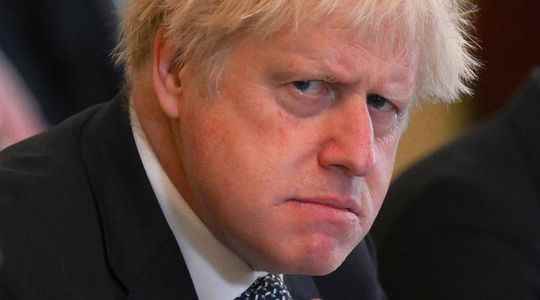His arrival at Saint Paul’s Cathedral, for the Jubilee Mass celebrating the 70th anniversary of the reign of Elizabeth II, did not go unnoticed on Friday June 3. British Prime Minister Boris Johnson was booed heartily by the crowd. A sign that, despite the festivities, the conservative leader is in turmoil after the latest revelations about the “Party gate” scandal, marked by the publication, on May 25, of the final report of the senior administration.
As a reminder, this report details a series of parties, sometimes very drunk, – e-mails and photos in support -, organized at 10 Downing Street, during the confinements. Periods during which the British were forced to make heavy sacrifices. Boris Johnson had already previously admitted having participated in several of them. He had apologized and had even been fined 50 pounds (60 euros) for non-compliance with anti-Covid rules during his surprise birthday drink. A first for a head of government in office.
“Boris Johnson’s days and weeks are numbered”
Boris Johnson has so far consistently refused to resign. The international scene has also “certainly allowed him a reprieve”, comments on this subject to L’Express the academic specialist in United Kingdom politics, Sophie Loussouarn. With in particular his strong positions on the subject of the war in Ukraine. His visit to kyiv on April 15 was symbolic but made an impression: the British leader was the first G7 leader to visit Ukraine since the start of the Russian invasion. The United Kingdom also sent more military and financial aid to Ukraine than Germany and France combined between January 24 and May 10, according to the Kiel Institute.
But today, “the days and weeks of Boris Johnson” are for the researcher well and truly “numbered”. The threat of a motion of no confidence hangs over him. Several MPs from his own party have called for his resignation. To trigger the procedure, 54 letters from Conservative MPs must be sent to the 1922 Committee (the Conservative Party’s parliamentary group). Once the 54 letters have been gathered, a majority of Conservative MPs must then approve or reject the motion. If, at that time, he is defeated, an internal election will be held to designate the new leader of the party.
It is currently impossible to know exactly how many letters have been received. “Forty-five Conservative MPs questioned Boris Johnson’s ability to lead the country, but only twenty MPs announced that they had sent one,” explains the academic. For her, the vote on the motion will probably not take place before the end of the by-elections on June 23 insofar as “the conservatives will not take the risk of weakening just before this election”.
Breathing new life into conservatives
The Conservatives, who came to power three years ago in the midst of Brexit, have indeed seen better days. The latest setback suffered by Boris Johnson’s party: the loss of 11 councils and more than 200 seats in the British local elections on May 5th. While the Labor opposition won seven councils and more than 120 councillors, including in constituencies historically acquired from the Tories in London. The victory of the nationalists in Northern Ireland is also a political earthquake across the Channel.
Galloping inflation does not help matters – 9% in April 2022 over one year according to the National Statistics Office. “Some people in England today have to choose between food and heating,” recalls the political scientist. Critics are thus accumulating in the face of the government’s action, which is deemed insufficient. “The Conservatives have fallen in the polls. They are at 29% while Labor is at 41%,” she continues.
Not easy in these conditions to breathe new life into the conservative movement. The question is not so much, for Sophie Loussouarn, to know who to replace Boris Johnson. “Serious and credible candidates exist,” she considers. She cites in particular “Jeremy Hunt, her main opponent among the Conservatives, Liz Truss, Minister of Foreign Affairs or Sajid Javid, Minister of Health”. But more that of their programs: “how to respond to the concerns of purchasing power of public opinion?”. Today “a change of leader would not necessarily solve the Conservatives’ problems but at least has the advantage of reassuring the MPs of the majority party in the House of Commons before the next general election in 2024”, she adds.
It should also be noted that another investigation, this time parliamentary, still within the framework of the “Party gate”, targets Boris Johnson and is still in progress. If the latter concludes that the Prime Minister has knowingly lied to members of the House of Commons, he is supposed, according to the ministerial code, to resign.
